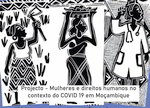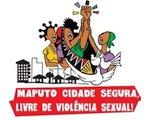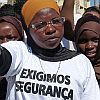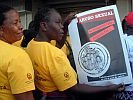The reform of Family Law:
processes and debates
by Maria Benvinda Levi
Published in: Outras Vozes, Suplemento do boletim n° 3, July 2003
The Commission of Legal Reform at the Ministry of Justice was created in 1997. The fundamental scope of the commission was to adjust the ordinary legislation to the Constitution of the Republic with priority to the Code of Criminal Procedure Code, some of the norms of the Penal Code, the Civil Procedure Code and the Volumes IV e V of the Civil Code in respect of Family Law and Succession Law.
A Sub-Commission was created, specialised in the reform of Family Law and Succession Law, with the mandate to study the reform in this specific areas of law. The Commission started working in March 1998.
In order to come to a profound and coherent reform, the Commission structured its work in four distinct phases.
Phase 1 had in view making a comprehensive assessment of existing norms in the area of family right and to identify the ones that violate the principles of non-discrimination and of equality of rights was established in the constitution of the Republic of Mozambique and other instruments of International Law ratified by the Mozambican State, as well as to identify de facto situations which warrant legal oversight.
This assessment was made through social investigation on the ground, investigation and analysis of comparative law, round tables with target groups, etc.
The information gathered was compiled in a document designated as “Preliminary Report”, which was discussed at a special seminar, at national level, held in April 1999, where critics , suggestions, comments and recommendations were collected that received due attention in the following phase.
Phase 2 aimed at elaborating the Pre-project of the Family Law, which should reflect the results of the Preliminary Report and other contributions received, without neglecting constitutional principles and International Law.
Phase 3, wherein the Pre-project was submitted to various focal groups amongst rural and urban population, men and women, youth and elderly, religious and non-religious, politicians and others of a wide range of sensibilities.
The discussions were held in various provinces of the country covering important segments of the population. The results obtained allowed the elaboration of the “Intermedium Report” which transmitted the initial position of the Commission, the different currents of opinions that had emerged over the process and the reasons why the Commission opted for one or another position.
Phase 4. In this phase the Commission elaborated the Draft Family Law, taking as its parameter cultural practices of the country registered in previous phases, the principles of equality and of non-discrimination established in the Constitution of the Republic and International Conventions, particularly the International convention of Children’s Rights, the African Chart about the Rights and Well-being of the Child and the Convention for the Elimination of all forms of Discrimination against Women. The Draft Family Law was already submitted to the Parliament and approved in general terms in its latest plenary session.
The Draft Law which still is to be appreciated by the Parliament (shortly it will be considered in detail), eliminated all legal dispositions that sustained discrimination and inequality in treatment of family relations, in relation to gender and civil state of the progenitors. An effort was made to reflect in the Law national traditions whenever they could be adjusted to constitutional commands and to the instruments of international law ratified by Mozambique.
In this context its important to stress the consecration of other modes of marriage which safeguard the interest of the partners and are better adapted to Mozambican reality, such as traditional and religious marriages, besides the civil marriage, which is still realized by a very restricted number of Mozambicans, although it is nowadays the only one with legal support. The consecration of other modes of marriage allows treating all Mozambicans in the same way, before the law, reinforcing a sense of being part of the same nation, independent of ones race, ethnic origin or religious believes.
As to matrimonial impediments, particularly age of marriage, which is today 14 and 16 years for girls and boys respectively, the Draft Law proposes to establish the age of 18 for both sexes. This change has as its fundamental support the principle of equality between men and women, as established in the constitution, besides social, economic and political reasons which recommend that age of marriage should be increased, particularly for girls.
Within the context of the same supposition, the reform also looked at the norm that attributes to men (husband) the status of head of the family with all related rights and obligations. This change was necessary in the light of the constitutional text as well as to be in accordance with the Convention for the elimination of all forms of discrimination against women. It further meant to turn home and the family into a conjugal place of affection, solidarity, understanding and mutual help, where wife and husband are companions discussing and sharing everyday experiences without being placed, out of legal imperatives, in a boss-slave relation.
It was found that many families are still established by people, free of any preconception, living in a de facto union relationship, even if the African reality does not promote such a situation. The Draft Law has in view to support this reality, attributing matrimonial rights in the case of dissolution through separation or dead, as well as enlarging the assumption of maternity and paternity as a way to better protect the children born out of such a relation.
In regard of separation and divorce, the most important changes centred in the acceptance of domestic violence as a fundament for the consecration of divorce through objective reasons and the enlargement of the time limit of expiration from one to three years.
Taking into account that children are considered a wealth in our cultural universe, the institution of affiliation was subject to changes, which had in view, first, to eliminate discrimination of people as a consequence of the civil state of their progenitors, and second, to reflect in the Law the perspective of the extended family.
In this context, parental power was conceived in a more modern perspective, wherein the child is seen as an active subject in the parental relationship, and not as a mere object. Assuming this position, the reform aimed at strengthening family relations, attributing to every member of the family, including the children of minor age, rights and responsibilities, founded on a sound and solid relation, build with love and respect, understanding and tolerance.
Taking into account that innumerous children, for most different reasons, don’t fall under parental power, some instruments are foreseen to take the place of parental power: institutions of tutelage, adoption and the “welcome family”, being the latter one an innovation.
This model is no more than the consecration of a national experience which occurred in the periods of major crises as there were the war and natural calamities that hit the country. In these occasions many children were separated from their parents and direct family members and other families were called to assume responsibility for their upbringing and education. In doing so, these families did not mean to turn the children into their sons or daughters, but just to solve a concrete and urgent problem. In these cases and contrary to adoption, the child did not lose its identity. This aspect was fundamental to the consecration of this figure, because it does not, as adoption, cause repugnance to Mozambican society.
At last, the range of family members to be supported after separation or divorce was extended to include collaterals in the 4 degree, people which lived in a de facto union relationship and stepfather/stepmother. This reform had in view that assistance to people in need should be provided only by the State in case of impossibility of the family to do so.
In the debates which started right after the constitution of the Sub-commission some aspects were, and still are, widely discussed. The most relevant aspects are:
- The consecration of the principle of inequality between men and women in ordinary law with the consequent changing of all dispositions which assign to the husband a role of supremacy in the family;
- The consecration of other modes of marriage, namely the traditional and the religious , provided that these modes do not violate the rules established in respect of matters of matrimonial impediments;
- The fixation of age of marriage at 18 years for girls and boys;
- The recognition of the family union as a mean to constitute family.
Below we will further elaborate on these aspects, taking into account the positioning of the Sub-commission.
As referred in the beginning of this document, the elaboration of the legal text, which today is the Draft Family Law, was preceded by an extensive assessment of existing sensibilities throughout the country, as well as an exercise to put the legal text in accordance with the Constitution of the Republic and instruments of international Law ratified by Mozambique.
In doing so the Commission had a clear perception of the impossibility to accommodate the interests of the whole population since, in several cases, those interests were contend with the principles of equality between men and women and non-discrimination consecrated in the Constitution. Hence, the ongoing debates were foreseeable since our cultural practice is not always in accordance with the law.
It is therefore not difficult to understand why, although aware of the above mentioned principles, the members of Parliament in their plenary debates insisted in maintaining the figure of ‘head of the family’, in allowing polygamy or that age of marriage should be lower for girls than for boys and/or should coincide with puberty. Such arguments have their base in cultural practices. They don’t have (and never can have) legal covering because they are not allowed by the Constitution and obligations assumed by the Mozambican State.
However, it is important to stress that the establishment of other marriage modes has in view to provide to all Mozambicans the same legal treatment, which is not the case today. If we pretend to provide the same legal treatment to all, independent of one’s race, ethnic origin or religious believes, we can not allow that some marry at the age of puberty when others do so at the age of 18; or that some are allowed to marry one partner at a time and others can be in more than one marriage without having dissolved a previous one. If we did so, we would not act in respect of cultural differences, but we would be allowing that in a country, united and indivisible as is Mozambique, the citizens had a differentiated legal treatment following their own conveniences.
Most people are in favour of increasing age of marriage. However, the idea that the girl should be younger than the boy is still widely valued, for reasons mostly related to social preconceptions.
When the Sub-commission fixed the same age of marriage for boys and girls it had in view to find a solution for several problems affecting young women since they stop playing and studying early to be spouses. By establishing the age of marriage for girls at 18 years, conditions would be created to guarantee that girls can use their right to education, sexual, reproductive and mental health and, finally, girls can actively participate in the development of society.
In respect of family union the Sub-commission took over the model of the de facto union foreseen in the previous Draft Family Law that was applied on an experimental base at the courts until 1990.
The consecration of the de facto union has to be seen as a result of a social imperative. The increasing number of people that constitute family in a de facto union and the problems forthcoming from this fact, mainly in matters of paternity and patrimony, would make it unrealistic not to foresee such a model. Indeed, when de facto union comes to an end, many women and children remain completely unprotected because men refuse to assume responsibility for their acts.
Finally, it is important to state once again that the Draft Family Law has the intention to comply with the social and cultural reality of the country, without violating fundamental constitutional principles such as the protection of family and the right to equality and non-discrimination of its members. The objective was to establish norms based on the principle that men and women are born as equals and with the same rights and that any sound relation presupposes the acceptance of this principle confirmed in the Declaration of Human Rights and clearly consecrated in the Constitution of the Republic of Mozambique.







 Information in English
Information in English



















